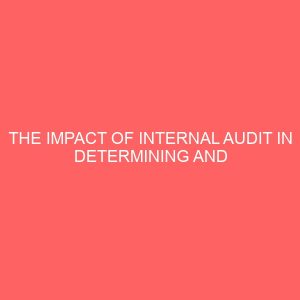Description
CHAPTER 1
1.1 BACKGROUND OF THE STUDY
Hornby (2010) defined an employee as “a person who is paid to work for somebody” (p.480). The International Labour Organization elaborate this definition by stating that employees are people who work for a public or private employer and receive remuneration in wages, salary, commission, tips, piece rate, or pay in kind. It is important to know that an employee is one who under a contract is employed by an employer in either a private or public entity of an organization to work for that particular organization, with a reward at the end of the work, be it a salary, wage etc on daily, weekly or monthly basis
In addition to this view, a Nigerian employee should not only be a salary, wage, etc earner, he/she should be given the liberty that is to have a voice or freedom to contribute in the decision making of the organization and should have the right to quit with genuine reasons and can be feared when he/she breaches the law with strong query before that. Employee motivation Among financial, economic and human resources, the latest are more essential and have the capability to endow a company with competitive edge as compared to others (Rizwan& Ali 2010). Employee performance fundamentally depend on many factors like performance appraisals, employee motivation, employee satisfaction, compensation, training and development, job security, organizational structure and others, but the area of study is focused only on employee motivation as this factor highly influence the performance of employees. Employee motivation is one of the policies of managers to increase effectual job management amongst employees in organizations (Shadare et al, 2009). A motivated employee is responsive of the definite goals and objectives he/she must achieve, therefore he/she directs its effort in that direction. Employee motivation is affected by both personalcharacteristics as well as workplaceenvironmentOrganizations benefit from „engaged workers” in a number of ways. Two-way communication helpsto shape employees perceptions and aid the company in understanding employee better. Employee satisfactionhas positive influence on customer satisfactions in the service industry (Harte, Schmidt, &Hayes, 2002). In addition, for organizations to achieve effective organizational managementtheremust be a free follow of communication between the employers andthe employees in the organization. The employee should be carried along in the decision makingof the company, it helps to reduce grapevine in work place. It is obvious to know that a satisfied employee works with enthusiasm in other to satisfy customersand achieve the organizational goals, while the reverse is the case to anunmotivated employee.Benefits of Employee Motivation in Nigerian OrganizationsThe importance of employee motivation in Nigerian organizationscannot be over emphasized, because it provides the following benefits: Improves level of efficiency of employees.The level of a subordinate or anemployee does not only depend upon his qualifications and abilities. For getting best of his work performance, the gap between ability and willingness has to be filled which helps in improving the level of performance of subordinates. This will result intoincrease in productivity, reducing cost of operations, and improvingoverall efficiencyin the work place(Adi, 2000).. Puts human resources into action
Every concernrequires physical, financial and human resources to accomplish the goals. It is through motivation that the human resources can be utilized by making full use of it. This can be done by building willingness in employees to work. This will help the organizationsin securing best possible utilization of resources (Rothberg, 2005).
Builds friendly relationshipMotivation is an important factor, whichbrings employees satisfaction. This can be done by keeping into mind andframing an incentive plan for the benefit of the employees. This could initiate the following things:Monetary andnon-monetary incentives,Promotion opportunities for employees, disincentives for inefficient employees.Industrial dispute and unrest in employees will reduce,theemployees will be adaptable to the changes and there will be no resistance to the change,this will help in providing a smooth and sound concern in which individual interests will coincide with theorganizational interests;thiswill result in profit maximizationthrough increased productivity (Anka, 1988. Leads to achievement of organizational goals.The goals of an organizationcan be achieved only when the following factors take place:-There is best possible utilization of resources, there is a co-operative work environment,the employees are goal-directed and they act in a purposive manner, goals can be achieved if coordination and cooperation takes place simultaneously which can be effectively done through motivation(Anka, 1988) Leads to stability of work force
Stability of workforce is very important from the point of view of reputation and goodwill of a concern.
Theemployees can remain loyal to the organization onlywhen they have a feeling of participation in the management. Theskills and efficiency of employees will always be of advantage to employersas well as employees. This will lead to agood public image in the market, whichwill attract competent and qualified people into a concern. As it is said, “Old is gold” which suffices with the role of motivation here, the older the people, more the experience and their adjustment into a concern which canbe of benefit to the organization(Rothberg, 2005)
Therefore this research seek to provide an evaluation of motivational policies in enhancing employee Performance in the public service.
1.2 STATEMENT OF THE PROBLEM
Employees constitute a vital resource of the organization in the civil service.
As a driver of organizational productivity , progress, and attainment of broad and sub objectives
Of the organization. However in the culture of Africa and in Nigeria employee performance
Can be only maximized if they are well motivated with the right motivational incentives.
Employees cut across defferent levels of cadre in the organisation as such proper motivational policy
Should be formulated and implemented if the civil service must maximize the performance of its work force. It is perplexing to note that the average attitude of the Nigerian worker to perform effectively at work lies on his being properly motivated.; otherwise what we find is redundancy, lateness to work, absenteeism, abandonment of duties, procrastination and gross misconduct .
Therefore the problem confronting this research is to profer an evaluation of motivational policies in enhancing employee performance in the public service.
1.3 RESEARCH QUESTION
1 What is the nature and significance of motivational policies
2 What is the impact of motivational policies on employees performance
3 What is the nature , significance and impact of motivational policies on employee performance
In Imo state civil services.
1.4 OBJECTIVE OF THE RESEARCH
1 To determine the nature and significance of motivational policies in the public service
2 To determine the impact of motivational policies on employee performance in the public service
3 To determine the nature ,significance and impact of motivational policies on employees performance
In imo state civil service
1.5 SIGNIFICANCE OF THE STUDY
The study shall highlight motivational policies for employee performance in the public service
It shall profer the impact of motivational policies on the performance of the employee
The study shall also serve as a source of information to managers and other professionals in the public service
1.6 STATEMENT OF THE HYPOTHESIS
1 Ho Employee productivity in Imo state civil service is low
Hi Employee productivity in imostate civil service is high
2 Ho Motivational policies in imo state civil service is not significant
Hi Motivational policies in imo state civil service is significant
3 Ho Impact of motivational policies on employee performance in imo state civil service
Is low
Hi impact of motivational policies on employee performance in imo state civil service is high
1.7 SCOPE OF THE STUDY
The study focuses on the evaluation of motivational policies in enhancing employee performance in the Public service with a case study of imo state civil service
1.8 DEFINITION OF TERMS
MOTIVATION DEFINED
motivation is viewed as a process of stimulating people to achieve organizational tasks as well as process of stimulating oneself to action to gratify a felt need
(Ajibola, 1976). In addition to this, Ajibola point out that employees are beingencouraged to achieve not only the organizational goals but also their own goals through motivation. This shows that organizations cannot do without the employees as their bedrock (employees) in achieving success.
EMPLOYEES DEFNED
Hornby (2010) defined an employee as “a person who is paid to work for somebody” (p.480). The International Labour Organization elaborate this definition by stating that employees are people who work for a public or private employer and receive remuneration in wages, salary, commission, tips, piece rate, or pay in kind. It is important to know that an employee is one who under a contract is employed by an employer in either a private or public entity of an organization to work for that particular organization, with a reward at the end of the work, be it a salary, wage etc on daily, weekly or monthly basis
In addition to this view, a Nigerian employee should not only be a salary, wage, etc earner, he/she should be given the liberty that is to have a voice or freedom to contribute in the decision making of the organization
ORGANISATION DEFINED
it is “an organized or cohesive group of people working together to achieve commonly agreed goals and objectives…. The basic objectives of most commercial organizations are to create a product or service that customerswil
l buy, thus creating profit (McGovern, 1999). However, not all organizations are for profit making. Some are service based. The hope of achieving goals and objectives may be the same, but the functions and activities will definitely differ.
ORGANISATION MANAGEMENT DEFINED
Organizational management is defined as “a process of planning, organizing, leading and controlling the effort of organization members and resources within an entity with the overall aim of achieving its objectives. The organizational management of a business needs to be able to make decisions and resolve issue in order to be both effective and beneficial. (Business dictionary.com). These simply highlight that for an effective organizational management, the basic function of management must be present and this alone cannot work without the resources and most importantly the lubricate of any organization which is the employee. This shows how important an employee is to the success of every organization.The relationship that exists between employee motivation and organizational management is very crucial; they are intertwined, an organization cannot work in isolation without the employees, because they serve as the engine that keeps the organization going. Therefore, where decisions are taken the employees must beput into cognizance,to achieve a long-lasting goal in the organization A motivated employee is a valuable asset, who candeliver immense value to the organization in maintaining and strengthening it business and revenue growth.







